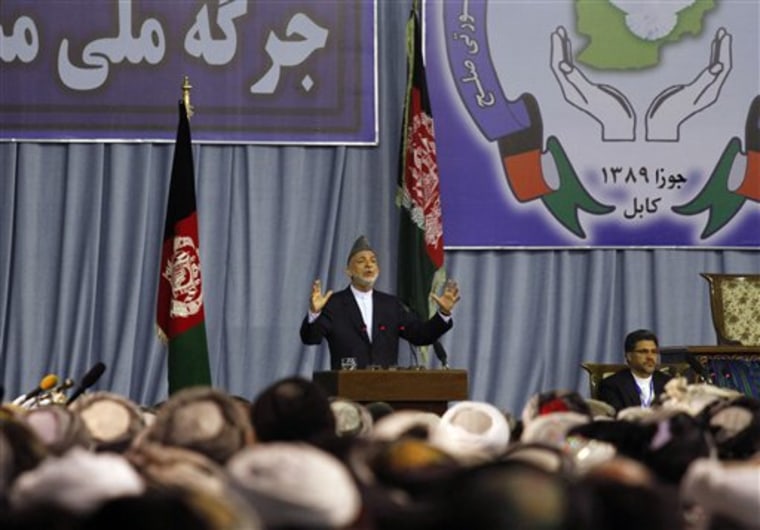Secret talks to end the war in Afghanistan have begun between representatives of the Taliban and the government of Afghan President Hamid Karzai, The Washington Post reported on its website Tuesday night.
Afghan and Arab sources cited by the Post said they believe for the first time that Taliban representatives are fully authorized to speak for the Quetta Shura, the Afghan Taliban organization based in Pakistan, and its leader, Mohammad Omar, according to the newspaper. The sources requested anonymity to discuss the development.
Omar's representatives have shunned negotiations in the past, insisting that all foreign troops withdraw first.
However, the Post reported that its sources said the Quetta Shura has begun to talk about a comprehensive agreement that would include participation of some Taliban figures in the government and the withdrawal of U.S. and NATO troops.
"They are very, very serious about finding a way out," one source close to the talks said of the Taliban, the Post reported.
The source told the Post said the leadership of the Taliban believed "they are going to be sidelined."
More radical Taliban elements
"They know that more radical elements are being promoted within their rank and file outside their control," the source told the paper. "All these things are making them absolutely sure that, regardless of [their success in] the war, they are not in a winning position."
Karzai long has said he will talk to insurgents if they renounce violence, sever ties to terrorists and embrace the Afghan constitution.
The Post reported that the half-dozen sources directly involved in or on the margins of the talks emphasized that they were preliminary in nature, even as the sources differed on how specific the talks have been.
All expressed concern that any public description of the meetings would undercut them.
"If you talk about it while you're doing it, it's not going to work," an official of a European country with troops in the country told the Post.
Asked about the Washington Post article, White House spokesman Robert Gibbs said that the administration had long supported reconciliation efforts by the Afghans, but added it was not involved in the talks, USA Today reported. He said any Taliban elements would have to renounce violence and support for al-Qaida and abide by Afghanistan's laws.
"This is something that has to be Afghan-led. It has to be done by Afghans. This is not something we do with the Taliban," Gibbs said, according to USA Today.
Speaking on msnbc's Morning Joe program, Dr Zbigniew Brzezinski, who was President Jimmy Carter's nationals security advisor from 1977 to 1981, said the Taliban talks make sense, given how many lives would be lost in the effort to secure a complete military victory in Afghanistan.
"We didn't go to war to drive the Taliban out. We went to war to get rid of al-Qaida," he said. "We have driven out al-Qaida more or less."
"If we can now be sure the Taliban doesn't give them a new shelter and especially if it's not in charge of the government, but only at most partially in the government, then I think we have accomplished our objective," he added.
'Disastrous consequences'
Asked whether it was moral to allow the Taliban back into some form of power, given their stance on women's rights, Brzezinski questioned how many lives could be sacrificed in that cause.
"What's the benefit to us? Sure it's a moral issue, but the cost is simply prohibitive," he said.
"I think if the war persists and we dig ourselves in more deeply, we will be ending up in a war involving Afghanistan and Pakistan versus us — a big, big regional mess with disastrous consequences for us," Brzezinski said.
The top commander in Afghanistan, Gen. David Petraeus, said last week that Taliban leaders have made overtures to reconcile with the Afghan government.
"There are very high-level Taliban leaders who have sought to reach out to the highest levels of the Afghan government and indeed have done that," Petraeus told reporters in Afghanistan.
Reconciling with Taliban leaders is being "pursued by the Afghan leadership at the very highest levels," Petraeus said.
He said conditions laid down by Karzai — that the Taliban respect the constitution and stop fighting — were "very clear, very established and, certainly, we support them as we did in Iraq, as the U.K. did in Northern Ireland; this is how you end these kinds of insurgencies," The New York Times reported.
The Afghan government last week also set up a 70-member peace council, formalizing efforts to reconcile with Taliban leaders and lure insurgent foot soldiers off the battlefield.
Waheed Omar, a spokesman for Karzai, denied that President Barack Obama's stated goal of beginning to withdraw U.S. forces from Afghanistan in July 2011, if conditions allow, spurred the Afghan government to set up the council or reach out to the Taliban.
Speaking in Kabul, Omar declined to confirm or deny the report of new meetings.
"There were contacts in the past and may now be direct or indirect ones. There have been regular contacts over the past two years," he said, when asked about the Washington Post story. "There haven't been any substantive talks, there have been contacts only."
On Tuesday, Pentagon Press Secretary Geoff Morrell said a broad Taliban shift toward reconciliation with the Afghan government was unlikely for now.
"I think it is too soon to suggest that there is ... a wider movement afoot, that the tide is turning in terms of re-integration and reconciliation," Morrell told reporters at a briefing at the Pentagon.
